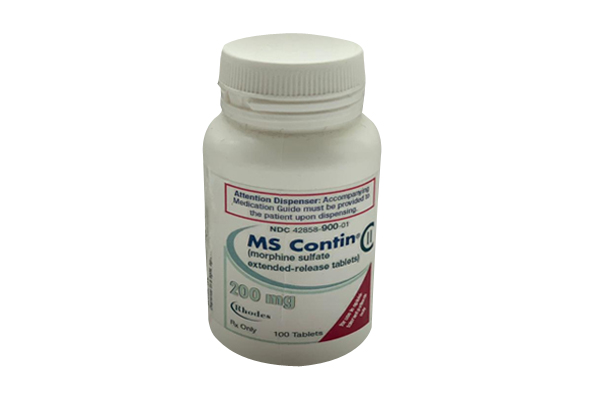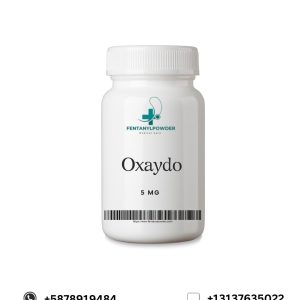MS Contin (morphine ER) is an opioid medication used to relieve pain when non-opioid medications don’t provide enough relief. This medication comes as a pill, an oral liquid, as well as a rectal suppository. Depending on the form, it can be used to control sudden (acute) pain quickly or more long-lasting (chronic) pain. Common side effects of morphine include feeling sleepy, feeling dizzy, and having
What is Morphine used for?
-
Pain that isn’t relieved by non-opioid medications
How Morphine works
Morphine is an opioid medication. It attaches to certain proteins called mu-opioid receptors in your brain to change how you react to pain. This helps lower how much pain you feel.
What are the risks and warnings for Morphine?
Morphine can cause some serious health issues. This risk may be even higher for certain groups. If this worries you, talk to your doctor or pharmacist about other options.
Potential for addiction and misuse
-
Risk factors: Personal or family history of substance or alcohol use disorder | History of mental health conditions
Morphine has a risk of addiction and misuse. Addiction can develop even at recommended doses as prescribed or if morphine is used for reasons other than prescribed (misuse). Sometimes, addiction and misuse can lead to life-threatening overdose. To lower the risk of addiction and misuse, your healthcare provider will prescribe the lowest amount of morphine that’s necessary for you for the shortest period of time possible.
Because of the high risk of addiction and misuse, the FDA requires a Risk Evaluation and Mitigation Strategy (REMS) program for morphine. Under the Opioid Analgesic REMS program, your healthcare provider will discuss with you about how to take morphine safely, what its risks are, and proper storage and disposal. These steps help keep you and your loved ones safe. If you have concerns about taking morphine, talk to your provider about other treatment options for pain.
Potentially life-threatening slowed breathing (respiratory depression)
-
Risk factors: Age 65 years or older | People who are very weak | Medical conditions that cause breathing problems (e.g., asthma, COPD, head injury) | Taking medications that can cause slowed breathing | Alcohol use | Taking high doses of morphine
Morphine can cause extremely slowed breathing that can be life-threatening. This can happen at any time, even when the medication is used as recommended by your provider. But generally, the risk is highest when you first start the medication or after your dose is raised. Don’t take morphine with alcohol or other medications that can slow your body down (e.g., benzodiazepines, muscle relaxants). Doing so can slow down your breathing even more. If you or a loved one notices that you have trouble breathing or have bluish-colored lips, fingers, or toes, get medical help right away.
Risk of accidental overdose
-
Risk factors: History of opioid use disorder | Previous opioid overdose | Taking medications that can slow the body down | Alcohol use | Taking high opioid doses | Taking more opioids than prescribed | Age 65 years or older | Age 18 years or younger
It’s possible to accidentally take too much morphine at recommended doses of the medication. Overdoses can also happen if it’s accidentally taken by a child or a loved one. Overdoses can be life-threatening if it’s not recognized or treated in time. Your healthcare provider might recommend that you carry naloxone (Narcan) with you at all times to quickly treat an overdose if it happens. It’s important for you and your caregiver to know how to use naloxone (Narcan) in case there’s an accidental overdose. Opioid overdose symptoms include extremely slowed breathing, slow heartbeat, extreme sleepiness, cold or clammy skin, and not responding to sound or touch. Call 911 right away if you think an overdose has happened.
Harm to newborn babies when taken during pregnancy
-
Risk factors: Long-term use during pregnancy
During pregnancy, opioids can be passed from you to your unborn baby through the placenta and umbilical cord. If you take morphine for a long period of time during pregnancy, there’s a risk that your unborn baby can become dependent on the medication. Once your baby is born, they can develop a condition called neonatal opioid withdrawal syndrome (NOWS) and experience withdrawal symptoms. Withdrawal symptoms in your newborn can include high-pitched crying, poor feeding and sucking behavior, trembling, irritability, and sometimes seizures. This condition can be life-threatening if not recognized and treated in time. Let your healthcare provider know if you’ve used morphine during pregnancy or if you notice these symptoms in your baby.
Difficulty concentrating and extreme sleepiness
-
Risk factors: Age 65 years or older | Taking other medications that make you less alert or slow your body down | Alcohol use
Morphine can cause extreme sleepiness and lower your ability to think, react, and focus. Taking morphine while drinking alcohol or with other medications that make you feel sleepy or relaxed (e.g., benzodiazepines, sleep medications, muscle relaxants) can worsen these side effects. For this reason, it’s best to avoid drinking alcohol or taking these medications while taking morphine. Make sure you know how this medication affects you before driving a car or doing activities that require your concentration. Talk to your healthcare provider right away if you feel too sleepy from taking morphine.
Low hormone levels
Some people taking opioids like morphine experienced a drop in their hormone levels. This is more likely to happen if you take the medication for more than a month. Symptoms of very low hormone levels include nausea, vomiting, loss of appetite, tiredness, dizziness, and weakness. Let your healthcare provider know right away if you experience these symptoms.
Low blood pressure
-
Risk factors: Age 65 years or older | Taking other medications that lower blood pressure or slow your body down | Dehydration
Morphine can cause extremely low blood pressure. This includes a sudden drop in blood pressure when you stand from a sitting or lying down position. As a result, you might feel dizzy or even faint. To avoid falling, stand up slowly or hold onto something while you get up if you’ve been sitting or lying down. If the dizziness or lightheadedness doesn’t go away, talk to your healthcare provider.
Higher risk of seizures in people with seizure conditions
-
Risk factors: History of seizure conditions
Opioids, such as morphine, can cause more frequent seizures to happen in people who’ve had seizures in the past. The medication might also raise the risk of seizure in other situations where seizures can occur. Let your healthcare provider know if you have seizures more often while taking morphine.
Physical dependence and withdrawal
-
Risk factors: Long-term use of morphine
If you take morphine regularly for a long time, you can become physically dependent on the medication. This means your body starts to rely on the medication to function. When you’re physically dependent on morphine, you might experience withdrawal if you lower your dose or stop taking the medication suddenly. Withdrawal symptoms can include restlessness, muscle pain, runny nose, yawning, sweating, chills, anxiety, and uncontrolled pain. Don’t lower your dose or stop taking the medication suddenly without talking to your healthcare provider. To prevent withdrawal symptoms from happening, you’ll need to follow your provider’s instructions carefully to slowly lower your dose. If you have concerns about taking the medication because of this risk, talk to your healthcare provider about alternative pain medications.
What are the side effects of Morphine?
Common Side Effects
- Constipation
- Nausea
- Vomiting
- Sleepiness
- Lightheadedness
- Dizziness
- Sweating
Other Side Effects
- Slowed breathing
- Changes in heartbeat
- Changes in blood pressure
- Headache
- Dry skin
- Itchiness
- Indigestion
- Changes in frequency of urination
- Distress or agitation
- Anxiety
- Nervousness
- Confusion
- Mood changes (e.g., depression, extreme happiness)
Serious Side Effects
- Slowed breathing
- Seizures
- Dangerously low blood pressure: blurry vision, confusion, dizziness, fainting, nausea, vomiting, weakness
- Accidentally taking too much (overdose): not responding to sound or touch; slowed breathing; slow heartbeat; extreme sleepiness; pale, blue, or cold or clammy skin
- Opioid withdrawal: restlessness, muscle or joint pain, runny nose, yawning or sweating more than usual, chills, irritability, anxiety
Pharmacist tips for Morphine
-
Take morphine exactly as prescribed. Taking the medication differently than it’s prescribed can cause side effects or accidental overdose.
-
To help with any constipation you might get from morphine, make sure to drink plenty of water. If your constipation doesn’t improve or worsens, ask your healthcare provider about other ways to manage this side effect or for medication recommendations.
-
Avoid taking morphine with alcohol or other medications that make you sleepy or react slower. Also don’t drive or do activities that need your attention until you know how morphine affects you. Doing so can greatly affect your ability to think clearly and lead to accidental injuries.
-
If you’ve been taking morphine for a long time, don’t lower your dose or stop taking the medication suddenly without talking to your healthcare provider first. Doing so can lead to withdrawal symptoms, such as restlessness, muscle or joint aches, chills, trouble sleeping, and anxiety. Follow your provider’s instructions to slowly cut back on your dose over a few weeks to prevent withdrawal.
-
Ask your provider or pharmacist about naloxone (Narcan). This medication can help reverse the effects of accidentally taking too much morphine. Make sure to tell your loved ones where you keep your naloxone in the event of an emergency. If you use naloxone for an overdose, you should still call for emergency medical help because its effects are temporary.
-
Store morphine out of reach from children, pets, or visitors. If you don’t need to take morphine anymore, throw away the medication through a take-back program. This lowers the risk of accidental overdose and helps prevent medication misuse.
-
For extended-release morphine: Swallow the pill whole. Don’t cut, crush, chew, or dissolve the pill. These extended-release pills are meant to release the medication into your body slowly so it lasts longer. If the outside of the pill gets damaged, too much morphine can get released into your body too quickly, which can raise your risk of side effects. This can lead to a life-threatening overdose.
-
For extended-release morphine capsules: If you have trouble swallowing the capsule, you can open it and sprinkle the contents over a spoonful of applesauce. Swallow all of the applesauce and medication right away without chewing. Don’t save any of it for another time. Rinse your mouth with water and swallow to make sure you’ve taken all of the medication. Throw away the empty capsule by flushing it down the toilet.
Competitive Pricing
While quality is our top priority, we also understand the importance of affordability. At Option Drugstore, we strive to offer competitive prices on all our products, including MS Contin (morphine ER) 15mg, 60mg, 30mg, 100mg, 200mg. We believe that everyone should have access to high-quality medications without breaking the bank.
Our strong relationships with suppliers and manufacturers allow us to negotiate favorable pricing, which we pass on to our customers. By choosing Option Drugstore, you can save money without compromising on the quality of your medications. We believe that affordable healthcare should be accessible to all, and we are proud to offer our products at competitive prices.
Trust Option Drugstore for Your MS Contin (morphine ER) Needs
When it comes to purchasing MS Contin (morphine ER) trust Option Drugstore to provide you with the best quality and reliable service. With our commitment to quality, convenience, and affordability, we aim to exceed your expectations. Shop with us today and experience the Option Drugstore difference!
Convenience and Reliable Service
At Option Drugstore, we make it easy for you to purchase MS Contin (morphine ER). With our user-friendly website and convenient ordering process, you can quickly find the medication you need and place an order with just a few clicks. We understand that your time is valuable, so we have designed our online drugstore to provide a seamless and hassle-free shopping experience.
Our commitment to reliable service extends beyond the ordering process. We offer fast and discreet shipping options to ensure that your medication arrives at your doorstep in a timely manner. We understand the importance of privacy when it comes to medical purchases, and we take every precaution to protect your personal information.
The Importance of Quality in MS Contin (morphine ER)
When it comes to purchasing any medication, quality should always be your top priority. At Option Drugstore, we understand the significance of providing our customers with the best quality medications. MS Contin (morphine ER) is a highly effective medication commonly used to manage pain. With our strict quality control measures, you can trust that the MS Contin (morphine ER) available at Option Drugstore is of the highest standard.
Our trusted suppliers and manufacturers ensure that each batch of MS Contin (morphine ER) is thoroughly tested for purity and potency. This ensures that you receive a product that meets the highest standards of quality and safety. We prioritize your well-being and work tirelessly to ensure that every medication we offer undergoes rigorous quality checks.





Reviews
There are no reviews yet.